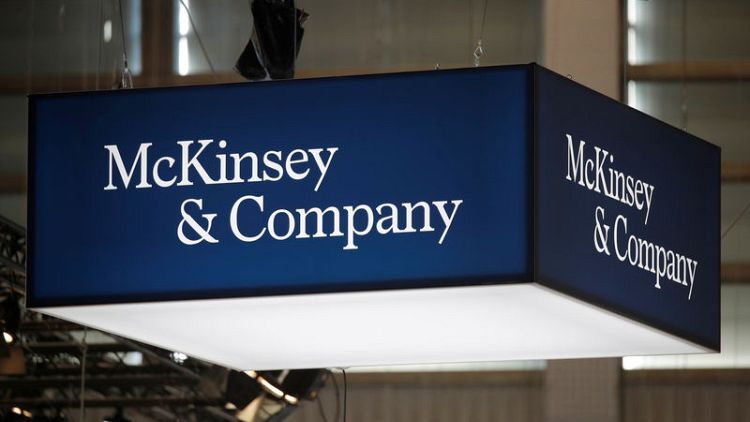By Tom Hals
WILMINGTON, Del (Reuters) - A federal judge dismissed claims on Monday by turnaround pioneer Jay Alix that McKinsey & Co violated racketeering laws when the consulting firm expanded into advising bankrupt U.S. companies.
Alix accused the consulting firm, known for its secrecy, of improperly concealing potential conflicts when it sought bankruptcy court approval to advise companies in Chapter 11.
The decision is part of a larger battle between McKinsey and Alix that has been waged since at least 2016 across multiple courts. Alix has said he is fighting for the integrity of the bankruptcy system, while McKinsey has said Alix is using the courts to try to stifle competition.
Alix said that McKinsey's bankruptcy work was a "criminal enterprise" that generated an unlawful profit of at least $101 million (£83.2 million), at the expense of AlixPartners, the firm Alix founded.
In Monday's ruling, U.S. Judge Jesse Furman of Manhattan dismissed claims brought under a racketeering law known as RICO that McKinsey had harmed AlixPartners.
"In sum, the link between McKinsey’s allegedly unlawful conduct and AlixPartners’ alleged injury is too remote, contingent, and indirect to sustain a RICO claim," wrote Furman.
Furman asked for further briefing on three other claims brought under state law, including allegations that McKinsey failed to exit the restructuring business as promised by the head of the firm in a private meeting with Alix.
While Alix has retired from AlixPartners, he still held a 35 percent stake when he sued McKinsey in May of 2018, according to court documents.
A spokeswoman for Jay Alix did not immediately respond to a request for comment.
"We are pleased that a court has yet again found Alix’s use of the court system to further his own agenda to be legally invalid," said a statement from a McKinsey spokesman.
McKinsey expanded in 2010 into bankruptcy consulting, which had been dominated by the AlixPartners, Alvarez & Marsal and FTI Consulting <FCN.N>.
Lawyers and other professionals seeking to work for a bankrupt company are required to disclose their connections to the company, its creditors and any other party in interest in a Chapter 11 case.
Their application is reviewed by the U.S. Trustee, a bankruptcy watchdog within the Department of Justice, and must be approved by a bankruptcy judge.
In the federal lawsuit, Alix alleged that McKinsey, the world's largest consulting firm, hid ties to lenders and competitors in numerous bankruptcy cases, including those of American Airlines and coal producer Alpha Natural Resources.
Furman said the U.S. Trustee was better placed to pursue Alix's allegations and noted that the watchdog has done so - reaching a $15 million settlement with McKinsey earlier this year to resolve incomplete disclosures.
(Reporting by Tom Hals in Wilmington, Delaware; Editing by Noeleen Walder and Steve Orlofsky)



